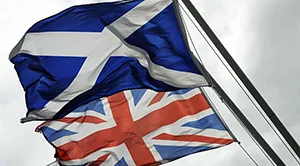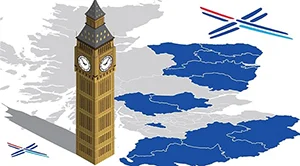 Talks of Scotland’s independence referendum have once again resumed amidst public outcry over the now-infamous partygate. While Westminster is dealing with the reverberations of the political scandal, the Scottish First Minister Nicola Sturgeon is wasting no time in reminding the public about her plans for a second independence referendum.
Talks of Scotland’s independence referendum have once again resumed amidst public outcry over the now-infamous partygate. While Westminster is dealing with the reverberations of the political scandal, the Scottish First Minister Nicola Sturgeon is wasting no time in reminding the public about her plans for a second independence referendum.
With Omicron raging in the country, it is all but clear the coronavirus will be at the top of politicians’ agenda at least until the spring. Nonetheless, independence has been a hot topic in Scotland since the first referendum in 2014 and is about to get even hotter in the coming months.
First Minister Sturgeon has committed to a 2023 deadline for the independence referendum but the real question is whether this target date is viable or not. Some believe the partygate scandal could act as a catalyst for those in favour of the union’s end despite Prime Minister Johnson’s insistence his government would not allow a new referendum.
Others are more sceptical, stressing that Johnson’s replacement is no guarantee the politician to succeed him would readily agree to a referendum rerun despite the Holyrood majority in favour of the move. Polling pundits and sportsbooks have also climbed on the referendum bandwagon with survey results and odds.
Legislative Powers of the Scottish and British Parliaments
 The Scotland Act of 1998 led to the establishment of the Scottish Parliament and set forth its legislative competence. As a result of its passage, the UK Parliament relinquished some of its legislative powers to Holyrood, while retaining control over other matters.
The Scotland Act of 1998 led to the establishment of the Scottish Parliament and set forth its legislative competence. As a result of its passage, the UK Parliament relinquished some of its legislative powers to Holyrood, while retaining control over other matters.
Devolved Matters vs. Reserved Matters
Holyrood currently can decide on devolved matters like justice, health, transport, education, housing, and rural affairs, among others. The 2012 and 2016 Acts further expanded the powers of Scotland’s Parliament when it comes to social security and income tax rates.
Scottish Parliament vs. Scottish Government
The 129 Members of the Scottish Parliament represent Scotts in different constituencies and regions. The MSPs select one person amongst them to act as First Minister and head the Scottish Government. The First Minister then elects some of the MSPs to act as Ministers and together they comprise the Scottish Government. Government Ministers essentially have two different positions. They act as MSPs on one hand and governmental members on the other hand.
Accountable to the Parliament, the Government has the remit to enforce devolved-matter policies and make proposals on laws and the state budget. By contrast, the Parliament passes the legislation on devolved matters and has the remit to question the decisions of both the Government and its head, the First Minister.
What Happened at the 2014 Referendum?
First Minister Sturgeon has committed to a rerun by the end of next year, less than a decade after the first independence referendum took place. As many as 84.59% of the Scots turned out to cast their votes in 2014, including people within the 16-to-17 age group, a precedent at the time. The result? Pro-union voters prevailed with a majority of 55% who voted in favour of staying against a 45% minority in favour of leaving.
| Results of the 2014 Scottish Independence Referendum | ||
|---|---|---|
| Remain/Leave Response | Number of Voters | Percentage of Voters |
| Remain | 2,000,926 voters | 55.3% |
| Leave | 1,617,989 voters | 44.7% |
| Blank | 3,429 voters | 0.09% |
| Electorate Turnout | 4,283,392 voters in total | 84.59% |
One of the main arguments of those who chose the remain option was that Scotland’s independence might result in the country’s departure from the EU. This argument no longer holds ground now that Brexit is officially a fact. If anything, the UK’s withdrawal has fueled more talks about a rerun of the independence referendum, which makes sense considering as many 62% of Scotland’s electorate voted against Brexit.
A C GRAYLING ‘There is no reason why the Scots should not have an independence referendum straight away, to limit the amount of time they are blocked by the Brexiters from their rightful place in the EU.’ #Indyref2 pic.twitter.com/IuQ2nq2ZlD
— Independent Voices (@Celebs4indy) February 5, 2022
As you will see from the table below, the distribution of yes votes varied across Scotland. Some regions like the Highlands, Eilean Siar, East and North Ayrshire, and North Lanarkshire all saw yes votes in excess of 45%.
The percentages of voters who favoured a withdrawal from the UK were significantly lower in the Borders and the Dumfries and Galloway areas, averaging 34% and 33% in 2014. We attribute these discrepancies across council areas to various social and demographic factors such as the number of unemployed benefit claimants, age, and birthplace.
| Distribution of Yes/No Votes in the 2014 Referendum Based on Region | ||
|---|---|---|
| Region | Percentage of Leave Votes | Percentage of Remain Votes |
| Scottish Highlands | 47.1% | 52.9% |
| Eilean Siar | 46.6% | 53.4% |
| East Ayrshire | 47.2% | 52.8% |
| North Ayrshire | 48.9% | 51.1% |
| Dundee | 57.3% | 42.7% |
| North Lanarkshire | 51.1% | 48.9% |
| South Lanarkshire | 45.3% | 54.7% |
| Stirling | 40.2% | 59.8% |
| Edinburgh | 38.9% | 61.1% |
| Fife | 45.0% | 55.0% |
| Argyll and Bute | 41.5% | 58.5% |
| Perth and Kinross | 39.8% | 60.2% |
| Glasgow | 53.5% | 46.5% |
| Dumfries and Galloway | 34.3% | 65.7% |
| Scottish Borders | 33.4% | 66.6% |
| Aberdeenshire | 39.6% | 60.4% |
| Orkney | 32.8% | 67.2% |
What Do Scots Think Based on Poll Results
 Scots’ sentiments about a prospective independence referendum tend to be inconsistent if we judge by what poll results have shown us so far. Polling during the late second half of 2020 indicated increased support for independence, with one poll by Ipsos Mori reaching as much as 55% in favour of separation.
Scots’ sentiments about a prospective independence referendum tend to be inconsistent if we judge by what poll results have shown us so far. Polling during the late second half of 2020 indicated increased support for independence, with one poll by Ipsos Mori reaching as much as 55% in favour of separation.
Several months later, in February 2021, the percentage of those in favour had dropped to 48%, only to increase again to 52% in November of the same year. We can observe similar inconsistencies in opinion across the surveys conducted by polling and market-research company YouGov.
| Ipsos Mori Poll Results from October 2020 to November 2021 | ||||||
|---|---|---|---|---|---|---|
| Response | October 2020 | November 2020 | February 2021 | April 2021 | May 2021 | November 2021 |
| Leave | 55% | 53% | 48% | 49% | 47% | 52% |
| Remain | 39% | 41% | 44% | 45% | 47% | 43% |
| Undecided | 6% | 6% | 7% | 6% | 6% | 4% |
| No Answer | N/A | N/A | 1% | N/A | N/A | 1% |
| YouGov Poll Results from August 2020 to November 2021 | ||||||
| Response | August 2020 | November 2020 | March 2021 | April 2021 | May 2021 | November 2021 |
| Leave | 46% | 43% | 41% | 39% | 41% | 40% |
| Remain | 40% | 42% | 43% | 45% | 46% | 46% |
| Undecided | 13% | 13% | 13% | 14% | 11% | 13% |
| No Answer | 2% | 1% | 2% | 1% | 2% | 0% |
*Poll data was extracted from whatscotlandthinks.org
Referendum Sentiments among the UK Public
 Led by First Minister Sturgeon, the Scottish National Party (SNP) had a good reason to celebrate in May 2021. It secured a record fourth term in the Scottish Government, achieving the largest vote share since the devolution referendum in 1997. The nationalist party was shockingly close to winning an overall majority as it took over 64 of the 129 constituency seats in Holyrood, plus 40% of the list vote.
Led by First Minister Sturgeon, the Scottish National Party (SNP) had a good reason to celebrate in May 2021. It secured a record fourth term in the Scottish Government, achieving the largest vote share since the devolution referendum in 1997. The nationalist party was shockingly close to winning an overall majority as it took over 64 of the 129 constituency seats in Holyrood, plus 40% of the list vote.
The historic victory inspired referendum confidence in Minister Sturgeon. She stated shortly after that any Downing Street politician who attempts to prevent the referendum from happening is effectively acting contrary to Scots’ democratic wishes.
🏴 Independence is about aspiration, empowerment and building a better, fairer society.
📣 Meanwhile, Unionist parties are running scared of the independence debate.
🗳️ Join us: https://t.co/bkLETL68v1 pic.twitter.com/6CHY3y3iIS
— Yes (@YesScot) February 3, 2022
Judging by the results of Ipsos Mori polls conducted in early April 2021, the majority of the UK general public shares the opinion of the First Minister. The surveys involved a little over 8,550 adult participants aged 16+ from England, Northern Ireland, Scotland, and Wales. As for the poll question, it was should the UK Government permit the Scots to vote for independence within the next five years if the SNP secures a majority after the 2021 parliament elections.
According to the survey, as many as 51% of the UK public think the British Government should give Scotland the green light for a second independence referendum. Around four in ten Brits, or 40%, thought this was a bad move while 8% had no opinion on the subject.
The regional breakdown of the survey results shows that referendum support percentages were the highest among people based in Northern Ireland and Scotland. Nonetheless, the majority of English and Welsh respondents also spoke in favour of a second referendum, with the percentages standing at 51%.
| Second Referendum Opinions of the UK Public Based on Country | ||
|---|---|---|
| Country | Percentage in Favour | Percentage Against |
| Northern Ireland | 66% | 27% |
| Scotland | 56% | 41% |
| Wales | 51% | 42% |
| England | 51% | 40% |
*Poll data is courtesy of Ipsos Mori
When asked about their sentiments towards Scots leaving the UK, approximately four in ten residents of Northern Ireland, Wales, and England responded they would feel mostly sad about this turn of events. Around 38% were indifferent about the potential secession. Residents of Northern Ireland are more prone to feel content with the prospect of Scottish independence.
Benefits and Downsides of Scottish Independence
 With pro-independence parties holding the majority in Holyrood, a second referendum to end the 314-year union between Scotland and England will undoubtedly become a priority for Scottish politicians.
With pro-independence parties holding the majority in Holyrood, a second referendum to end the 314-year union between Scotland and England will undoubtedly become a priority for Scottish politicians.
The polls we previously examined indicate a divide in public opinions regarding this matter. Then again, this is normal considering independence will have both negative and positive implications for Scotland and the UK as a whole. Here are the key ones at a glance.
The Benefits
Secession would enable Scotland to return to the European Union. To let the numbers speak, as many as 62% of the country’s population voted in favour of the UK not leaving the EU in 2016 as opposed to nearly 47% of England residents who chose this outcome. A return to the EU would mean access to a single internal market where commodities, labour, money, and people move freely without the obstruction of national borders.
The UK would devolve all legislative powers on currently reserved matters to the Scottish Parliament, giving it the freedom to pursue its own policies on foreign affairs, military defence, environmental issues, and social security.
The Downsides
Scotland would have to reapply independently for membership in key international organisations like NATO and G7. It is currently a member through its association with the UK, but would lose its membership if it secedes from the union. Without access to these transnational organisations, the country’s stance on global matters like peacekeeping, international diplomacy, and global warming would not be as influential.
Secession might have a negative impact on Scotland’s trading performance. Government data reveals that as much as 60% of the country’s exports, not counting natural gas and oil, go to the UK. By contrast, the EU accounts for a meagre 19% of Scotland’s exports. Last but not least, Scotland is likely to see a rise in trading costs should an international border with England become a fact.
Scottish Referendum Betting Odds
Renowned UK-licensed sportsbooks have also taken notice of the much-debated second referendum. Various betting markets are available for this event, with pricing that generally reflects the overall division of public opinion in the UK. One of the markets on offer, Next Scottish Independence Referendum Results, comes from Paddy Power.
The estimates of Paddy’s oddsmakers suggest that the outcomes For and Against Independence are equally possible, hence they share the same pricing of 5/6. William Hill, one of the oldest bookmaking businesses on British soil, offers pricing for the year of the second independence referendum.
Punters have a choice from four options, with a rerun in 2022 being the less likely scenario at 28/1, or 3.4% implied probability. The most probable outcome is for the referendum to take place no earlier than 2025, with odds standing at 8/15 (65.36%).
Ladbrokes estimates the likelihood of a 2022 referendum is slightly higher at 25/1 (3.8%). Another market to punt on at Ladbrokes is Scotland to Vote Yes to Independence by 2023 but the odds are slimmer at 40/1.
| Betting Odds for the Year of the Next Scottish Independence Referendum | ||
|---|---|---|
| Outcome | William Hill | Ladbrokes |
| 2022 | 28/1 | 25/1 |
| 2023 | 4/1 | 5/1 |
| 2024 | 4/1 | 7/2 |
| No sooner than 2025 | 8/15 | 4/9 |
| Paddy Power Odds for the Results of a Second Scottish Independence Referendum | ||
|---|---|---|
| Outcome | For Independence (Pass) | Against Independence (Fail) |
| Odds | 5/6 | 5/6 |
| Ladbrokes Odds for Scotland to Vote Yes to Independence by 2023 | |
|---|---|
| Odds | 40/1 |
- Author


